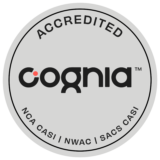
Think back to high school science class. What lessons do you remember the most? What made them standout? Was it your teacher telling you about chlorophyll and photosynthesis via slideshow, or visiting a local greenhouse and learning about plant development and growing techniques, and then going home with your own seedling? The latter is an example of experiential learning (EL), a process through which a learner constructs knowledge, skill, and value from a direct experience characterized by a high level of active involvement.
During an EL lesson, instruction is designed to engage learners in direct experiences that are tied to real world problems and situations in which the instructor facilitates rather than directs the learner’s progress—learning from the process is at the heart of experiential learning. Rather than the traditional classroom learning experience in which a teacher is telling the student what he or she should be learning, a student participating in experiential learning is actively engaged in posing questions, investigating, experimenting, being curious, being creative, and constructing meaning, giving the student a personal stake in the subject. It is this discussion, reflection, critical analysis, and synthesis of information that allows students to decipher what happened, determine important takeaways, and decide what comes next in their learning adventure.
Experiential Learning Improves Higher Order Thinking
Experiential learning has been proven to increase higher order thinking skills (Ives and Obenchain 2006), including prioritizing, analytic perception, analogical and logical reasoning, question posing, and going beyond information into discovery, reasoning, organizing, and argumentation. Higher order thinking stands in contrast to lower order thinking which involves rote memorization and recall of information, as well as other non-complex intellectual work. It is rare a job application requires applicants be able to memorize the state capitals, but very typical that it calls for critical thinking and complex problem solving skills. It is important to note that EL’s role in increasing higher order thinking skills does not lead to a loss in lower order thinking skills.
Social Responsibility Through Service Learning
Service learning, a genre of experiential learning, is an especially effective instruction method for students to learn about complex issues within larger environments. Experiential learning has been shown to increase socially responsible behavior when students learn about social problems outside of a classroom setting, “transforming them into agents of positive social change within their communities." Further research suggests that EL in the form of service learning can help students develop positive attitudes toward life, encourage acceptance of responsibility, and inspire personal growth by developing an understanding of their strengths and weaknesses in real world scenarios.
Connecting Academics with Real Life Work
Keeping students interested in their education can be a difficult task for any teacher, and not all students respond equally to all teaching styles. To keep students interested, it is important that they see the connection between school academics and work—students want to see this connection. Opportunities For Learning, in partnership with Pathways In Education, a national network of public schools and experiential learning programs, has developed EL experiences around central themes and activities designed to teach students how to set goals, both as a group and on an individual level, and overcome any obstacle. By first exciting students about learning and then demonstrating to them the link between academic success and career success, OFL and Pathways’ EL programs have proven to increase graduation and retention rates, including among of English Language Learner (ELL) students, students living in poverty, and those who are or are at-risk of being homeless.
Sources
Ives, Bob, and Kathryn Obenchain. 2006. “Experiential Education in the Classroom and Academic Outcomes: For Those Who Want It All.” Journal of Experiential Learning 29.1. 61-77.
Caulfield, Jay, and Treesa Woods. 2013. “Experiential learning: Exploring its long-term impact on socially responsible behavior.” Journal of the Scholarship of Teaching and Learning 13.2. 31-48.
Kolb, Alice Y., and David A. Kolb. 2009. “Experiential Learning Theory: A Dynamic, Holisitic Approach to Management Learning, Education and Development.” The SAGES Handbook of Management Learning, Education and Development. Edited by S.J. Armstrong, and C.V. Fukami. 42-68.
Eyler, Janet, and Dwight E. Giles Jr. 1999. Where's the Learning in Service-Learning? Jossey-Bass Higher and Adult Education Series. Jossey-Bass, Inc.
Eyler, Janet, and Dwight E. Giles Jr. 2002. "Beyond surveys: Using the problem solving interview to assess the impact of service-learning on understanding and critical thinking." Service learning: The essence of the pedagogy: 147-160.



